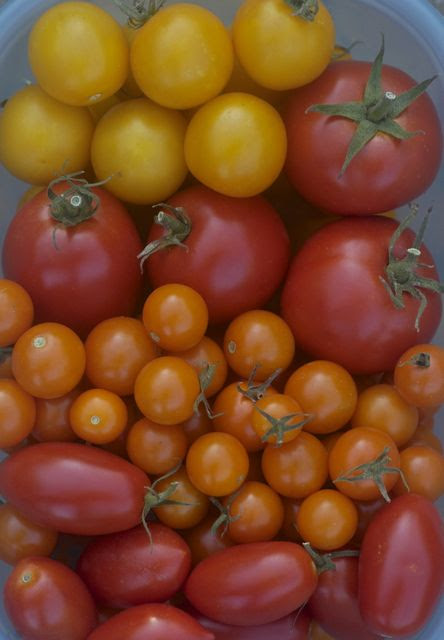When the rain came in mid-June, it was a sure bet that you could find Kevin Mink at CommonWealth Urban Farm, out in front of the flower lot. Kevin had been working with pollinator garden intern Andrew Johnson, Lia and volunteers to build the bioswale that would capture water that flows down 32
nd street during a rain.
Water is diverted off the street into a holding ditch where it waters the roots of pollinator plants on either side, before slowly leaving the swale, some of the grimy oils filtered out. Sure enough, on that rainy day, they were all three there, in the pouring rain, soaked. You can watch Kevin’s video below.
Kevin is an urban soil health specialist for the Oklahoma County Conservation District. He moved to Oklahoma City a year ago after his wife Mikaela was matched to her obgyn residency at OU. Kevin was working for Trees Atlanta in Georgia coordinating full spectrum restoration projects. “Taking a field of kudzu and transforming it into an ecosystem,” he said. “It’s cool to watch; the project never really stops.”
Growing up in northeast Pennsylvania, Kevin spent a lot of time in nature, through the Boy Scouts. “That put me on a path,” he says. At Drexel University, he studied engineering but soon learned he didn’t like computer programming and switched his major to biology and transferred to Vanderbilt. A plant biology teacher inspired him. “She was a funny, quirky plant person,” he says. “She saw my eye for the natural world. I was her teaching assistant for awhile.”
Kevin’s first research project was observing the activity patterns of chameleons in Equatorial Guinea, West Africa. “I’d go out at night, find a chameleon on a branch and go back the next morning and watch it all day.”
As an urban soil health specialist, he is an educator and problem-solver. “There is so much around soil. For instance, I’m talking with people about protecting water resources, growing native plants.” This week he consulted with a community member where a lake is having algae issues. “I asked what they do to their lawns. Do they garden? I was able to help them see connections between fertilizer applications and algae in the lake. I’m a dot-connector.”
“It’s an uphill battle,” says Kevin. “It’s easy when people are interested and open. There are people who are hard to reach. My education and background don’t matter; I can’t convince some people and it’s disturbing. But it’s exciting when I connect with someone who sees something new.”
Studying for his master’s in landscape architecture at the University of Oklahoma, Kevin’s focus when he took the job with the County conservation office, was on pollinator habitat. He lives near CommonWealth and had taken a tour of the farm. When he learned that CommonWealth wanted to expand its pollinator gardens and that there was an NRCS grant to do just that, he knew he had found a fitting partner. “It was a perfect match,” he says. “The project is still in progress. And we’ll watch it next spring. To see your work in action is the greatest reward.”
Another dream is to pursue the possibility of transforming college campuses into urban food systems. “I’ve been thinking about it a lot. A university is a microcosm of society. I’d like the opportunity to integrate a food system into a university campus.”
Kevin and Mikeala don’t expect to stay in Oklahoma. Their families are on the East and West Coasts. But for now, we are extremely glad to be working and learning from Kevin. If CommonWealth’s experiment with the bioswale and pollinator garden pan out, Kevin wants to encourage more rain gardens in Oklahoma City. Nothing would please us more!

